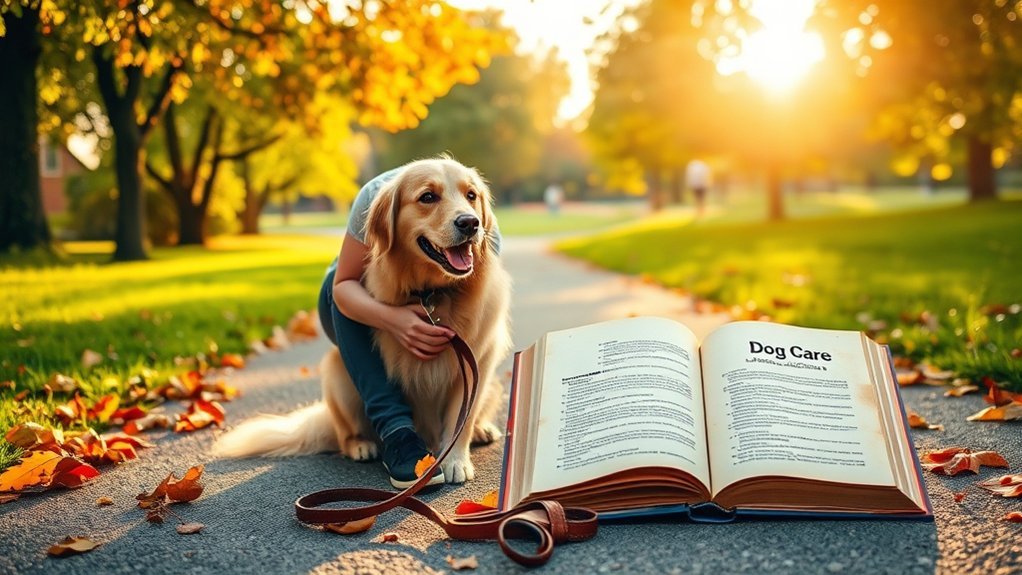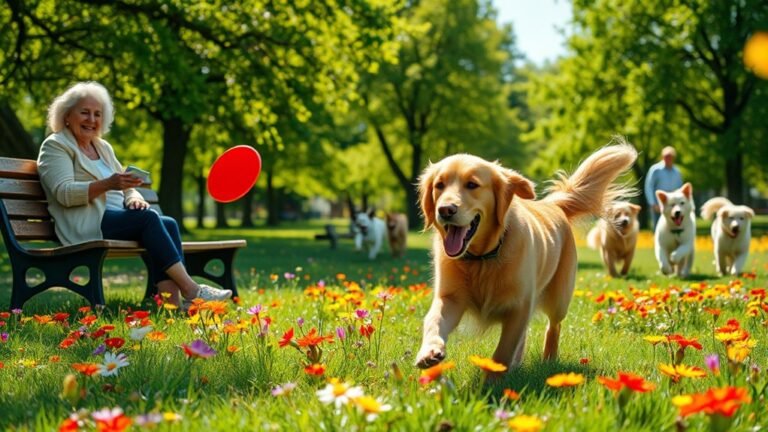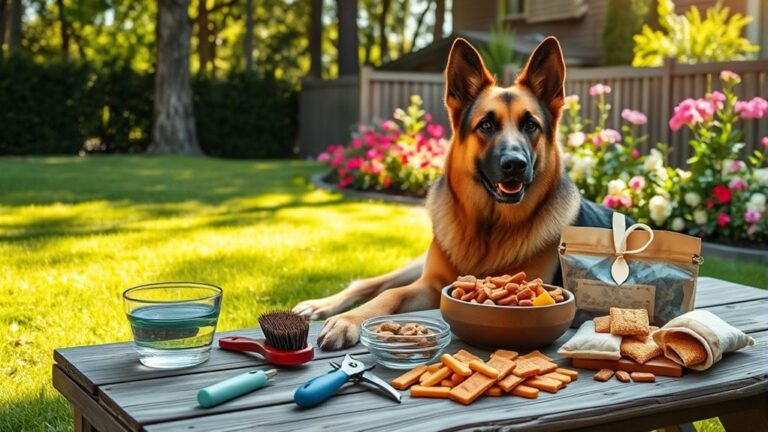10 Virtues Every Good Dog Owner Should Follow
Being a dog owner is a fun and rewarding experience, but it can be tough sometimes too. To build a strong bond with your dog, you need to be patient and kind. When you are consistent in how you treat your dog, it helps them feel safe and loved. Understanding how your dog feels can make it easier to talk with them.
As you enjoy time with your furry friend, you may wonder what other important qualities you should have. Let's look at some key traits that every good dog owner should have:
- Patience: Training a dog takes time. Be patient as your dog learns.
- Compassion: Show love and care. Your dog can sense your feelings.
- Consistency: Stick to your routines. Dogs feel secure with regular habits.
- Understanding: Pay attention to your dog's body language and feelings.
- Responsibility: Take care of your dog's needs, like feeding and walks.
- Communication: Use clear commands and signals. This helps your dog understand you better.
- Training: Teach your dog basic commands. This makes life easier for both of you.
- Kindness: Treat your dog gently. They thrive on love and positive attention.
- Time: Spend quality time with your dog. They enjoy being with you.
- Fun: Enjoy activities together. Playtime strengthens your bond.
By developing these qualities, you can be a great dog owner. Your dog will appreciate your effort, and your relationship will grow stronger. Enjoy every moment with your furry friend!
Key Takeaways
- Be patient when training your dog. Let them learn at their own speed. This helps build trust and a strong bond between you and your pet.
- Show compassion to your dog. When you understand their feelings, they feel loved and safe in your home.
- Stay consistent with routines and rules. This helps your dog know what to expect. It makes it easier for them to learn good behavior.
- Take responsibility for your dog's care. Make sure they get enough exercise, fun activities, and regular vet visits. This keeps them happy and healthy.
- Pay attention to your dog's body language and sounds. Understanding their emotions will help you connect better and train them more effectively.
Patience
Having a patient mindset is very important for dog owners. Training your dog can be a bit challenging, so it's key to stay calm. Every dog learns at their own speed. By using good training methods, you can help your dog learn better.
Instead of getting upset when your dog doesn't get it right away, remember that being consistent and patient can lead to great outcomes. Celebrate the little wins, and know that bumps in the road are normal.
Dogs pick up on how you feel, so your patience helps both you and your pup. Together, you'll build trust and grow your connection.
This journey can be fun and rewarding for both of you.
Compassion
Training and caring for your dog is a journey filled with love. An important part of this journey is compassion. Understanding your dog's feelings is key. It's not just about giving commands or setting rules; it's about knowing what your dog needs.
When you show empathy, you help your furry friend feel safe and loved. Using a calm voice or a gentle touch can ease their worries. This builds trust between you and your dog.
If your dog is scared of loud noises or hesitant to go for walks, it's vital to notice these feelings. Responding with kindness and patience helps them feel better.
Celebrate the small steps they take, even if they seem minor. This encouragement shows your dog that you care.
Consistency
Consistency is key for training and caring for dogs. When you create clear routines and follow them, your dog learns what you expect quickly. This routine builds trust and makes your bond stronger.
Just think how your pup feels knowing what you want them to do!
It's important to have the same rules all the time. This means rewarding good behavior and stopping bad habits. Practicing commands regularly helps your dog remember what to do.
Being consistent also connects you with other responsible dog owners. You all want to raise happy and well-behaved dogs.
Together, you can create a loving and obedient family member that everyone enjoys being around.
Responsibility
Being a responsible dog owner means taking care of your dog every day. This goes beyond just giving them food and a place to sleep.
You need to make time for daily walks, playtime, and fun activities that keep their mind active. Regular trips to the vet are important, too. These visits help catch health problems early and keep your dog healthy.
Owning a pet is a journey filled with love and commitment. Your dog depends on you for happiness and safety.
You're more than just someone who feeds them; you're their friend and partner. By being a responsible owner, you build a strong, loving bond that makes both of you happy.
Understanding
Understanding your dog is more than just knowing its breed or basic needs. It's about feeling their emotions and recognizing their behavior. Building a strong bond is important for a happy relationship.
Here are three things to watch for:
- Body Language: Look at their tail, ears, and how they stand. These can show you how they feel.
- Vocal Sounds: Different barks or whines tell you if they're happy, scared, or need something.
- Change in Routine: Pay attention to how they act when things change around them. This can show you if they feel safe or anxious.
Get to know your dog better by watching these signs. It helps you connect and care for them more!
Communication
To really connect with your dog, you need to communicate well. This means more than just talking. It's important to notice how your dog shows feelings without words. Look at their tail, ears, and body. These movements tell you what they need or how they feel.
Listening is also key. When you spend time with your dog, be focused and watch what they do. See how they react to your voice or movements. This back-and-forth makes your relationship stronger and builds trust.
Your dog loves to feel close to you, so the more you try to understand them, the better your bond will grow. Remember, clear communication is the start of a loving friendship.
Positivity
Making a happy space for your dog can really bring you closer. When you keep things positive, you both can have fun and build a strong bond.
Here are some easy ways to do this:
- Give Rewards: When your dog does something good, give them a treat or some praise. This helps them learn what to do more often.
- Play Together: Spend time having fun. Play fetch or take a nice walk. These moments make you both smile and enjoy each other's company.
- Be Calm and Cheerful: Your dog knows how you feel. If you stay positive, your dog will feel safe and loved.
Commitment
Being a good dog owner means being committed. It's more than just bringing a dog home; it's about being there for them every day.
Your dog needs your love, guidance, and care. This means spending time with them through play, training, and meeting their basic needs.
Daily activities, like walks and cuddles, help build a strong bond between you and your dog. These moments are important. They bring joy to both of you and make your lives richer. Your routine can be a fun part of your day.
Empathy
Empathy is very important for being a great dog owner. It means understanding how your dog feels and what they need. This connection can make your bond stronger and help your dog feel better.
Here are some simple ways to build empathy with your dog:
- Watch Your Dog: Look at your dog's body language and sounds. They communicate more than just barking or wagging their tail.
- React with Care: If your dog seems anxious or excited, pay attention to those feelings. A calm response can help ease their worries, and a cheerful response can make them happy.
- Create Trust: Be patient when you train your dog. If they know they can count on you, it makes them feel safe and helps them learn better.
Being an empathetic dog owner will improve your relationship with your furry friend!
Adaptability
Being adaptable is key when you own a dog. Dogs have their own unique personalities and moods. Sometimes, they can change suddenly, acting differently or even getting sick.
When this happens, having a flexible routine helps. You might need to change your walking times or try new training methods.
Being open to different approaches can bring you closer to your pup. They count on you to help them when things get tricky. By paying attention to their needs, you create a safe space where they feel happy.
Adaptability is essential for a good relationship with your furry friend. When you adjust to their changes, you build trust. This makes your bond stronger and helps both of you enjoy your time together even more.
Frequently Asked Questions
What Should I Do if My Dog Misbehaves Despite My Efforts?
If your dog misbehaves even though you are trying hard, don't worry! You can use some simple discipline methods along with positive rewards. Keep using the same commands every time. When your dog does something good, give them a treat or praise. This helps your dog learn what you want and strengthens your bond with them. Remember, be patient and consistent. Good luck!
How Do I Know if My Dog Is Truly Happy?
To know if your dog is happy, watch their actions. A wagging tail, playful barks, and a relaxed body show they feel good. Spend time playing with them or cuddling. This helps you both feel close and happy together. Your dog's joy shines through these moments.
Can My Dog Sense My Emotions?
Yes, your dog can sense your emotions. Dogs share a close bond with humans. They have a special ability to feel what we are feeling. When you are happy, your dog can sense it and may wag its tail, jump around, or play with you. When you are sad or stressed, your dog can tell, too. They might cuddle with you or stay close to offer comfort.
This connection helps dogs provide support and companionship when you need it. It's like they know when you need a friend. So, if you're feeling down, don't be surprised if your dog comes to you for snuggles. They just want to help you feel better!
What Activities Can Strengthen My Bond With My Dog?
To make your bond with your dog stronger, try some fun activities together. You can play training games or go on outdoor adventures. These activities help you both trust each other and talk better. Plus, they create special memories that bring you closer and help you understand each other more. Enjoy these moments and watch your friendship grow!
How Can I Better Understand My Dog's Body Language?
To understand your dog's body language, pay attention to their signals. Look at their tail and ears; these can tell you a lot about how they feel. For example, a wagging tail often means they are happy, while ears that are back might mean they are scared or unsure.
Learn about common dog behaviors, like barking or whining, and what they mean. When you understand your dog better, you'll feel closer to them and respond to their needs more effectively.






